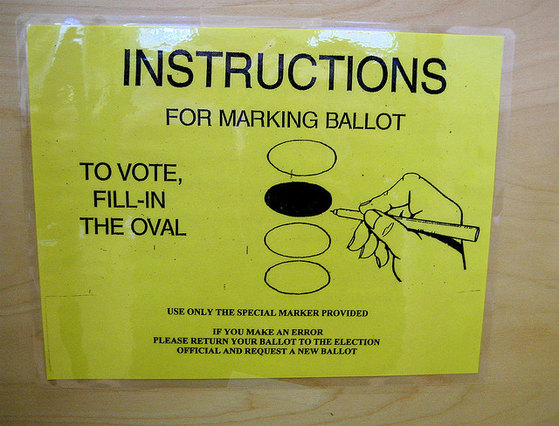
I agree with Graeme Edgeler over at Legal Beagle: you should probably read the Waitakere (Sepuloni/Bennett) recount/judicial review judgment (pdf) by Judge Adams. Graeme calls it 14 pages of democracy.
It’s written in plain English, and it’s no surprise that Judge Adams has a Masters in Creative Writing and has written a book of poems.
“[6] Imagine a large, vacated, open-plan office. It is well-lit, day or night, and there are windows along one side. At one end, it connects, through a door, to another similar room; at the other end, a door connects it to a large kitchen-dining area. It is not flash but the basics are provided. The room is furnished with tables made of cardboard. Four large tables have been created; achieved by pushing six tables together, three on one side and three on the other. Sellotape strips join them together, and ensure that there is no gap into which a slip of paper could disappear. A single cardboard table stands at the head of each large table – this is the place for the table leader. The folding chairs have slightly padded seats. On these seats the counters will sit for several hours each day. This is the Waitakere electorate offìce.”
Some interesting bits from the judgment:
Dual votes
On Election Day I remember having a discussion on Twitter about what happens if it turns out there is more than one vote for a voter. I asked at a polling place but they weren’t too sure either. Basically, the election people find out what happened from the voter, and if they seem legit, they allow their actual vote.
“[22] All the polling place records are collected and a thorough check is made in order to discover if anyone has been given more than one ballot paper; this is referred to [as] “dual votes”. Where dual voting seems to have occurred the Returning Officer conducts a check – even having her staff call to the home of the voter – so that the voter can shed light on the matter. The rule is that dual votes are both disallowed but if enquiry shows that the real voter received only one paper, their vote is allowed.”
Unenrolled voters
Nearly 400 votes weren’t counted because the voters weren’t enrolled to vote.
“[24] … In Waitakere, 393 people who cast votes were found not to be enrolled anywhere so their votes remained unopened, never counted. Those votes did not form any part of the official count.”
National paranoia
A National Party scrutineer wanted the building guarded by police. The judge: “The police were likely to have more productive tasks on hand”.
“[42] At approximately 8:15pm on the Wednesday evening a National Party scrutineer, Mr Mark Brickell, requested that I ask police to guard the building. He submitted that, if word leaked out that the vote seemed closer than the official count, there might be an attempt to interfere with the voting forms. I saw no evidence of any such risk; the suggestion had not been made earlier; the police were likely to have more productive tasks on hand; the building seemed secure. I provided a hand-written decision which gave my reasons. I permitted either party to employ security guards to attend outside the building provided they notified me, and I gave them my cellphone number for that purpose. I received no call. In the morning the ballot papers were still where I had left them.”
<3
Best. Judgment. Ever.
“[47] … My favourite was the voter who emphasised their tick for Carmel Sepuloni by drawing a little orange heart in the rectangle containing her name.”
We don’t like admitting mistakes, or we love trees
Or we don’t know that we can get another voting paper if we screw one up?
“[49] … Quite a few voters had made ticks that they had scribbled over with the orange pen, but left a clear tick in another circle, which I took to be a clear indication of their preference. It seems that voters are shy of admitting they have spoiled their paper, because they could easily have obtained another. This might be fruitful area for voter education.”
The downside of transparent orange ink
Christopher Nimmo on the blog post: “But orange is just such a perfect colour for highlighting!”
“[52] … In one, the voter had made a tick for Carmel Sepuloni, and drawn a wavering line through her name. It is possible that the intention was to highlight the choice but I could not exclude the possibility that the voter had struck out her name. For me, this decision is much closer to my line than the previous decision. My level of doubt about whether the line was a change of heart of an emphasis is high; the possibility that a vote was intended is real. Nevertheless, close though it is to the line, I could not be sure that the voter clearly indicated that choice and for lack of clarity I treated it as informal.”
I think this all illustrates that in New Zealand the people dealing with votes actually care.
“I may heartily dislike the results of our latest election, but I couldn’t and wouldn’t dispute its validity. We’re lucky that way.” –Lucy Steward, comment on Legal Beagle.
Image credit: Liz West